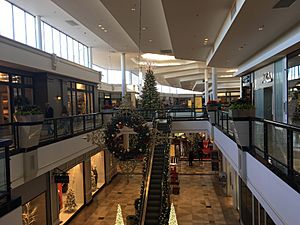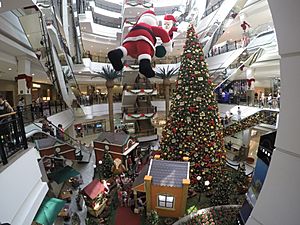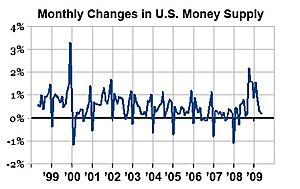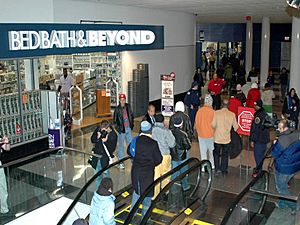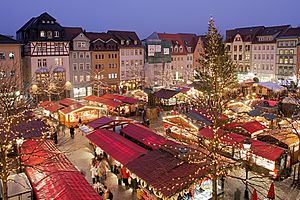Economics of Christmas facts for kids
The economics of Christmas looks at how much money is spent and earned during the Christmas season. This time of year is very important for businesses all over the world. People buy lots of gifts, decorations, and supplies. This makes sales go up a lot.
In the U.S., the Christmas shopping season often begins in October. In Canada, stores start advertising just before Halloween (October 31). They increase their ads after Remembrance Day on November 11. In the UK and Ireland, Christmas shopping starts in mid-November. This is usually when the Christmas lights are turned on in towns.
About one-fifth to one-quarter of all personal spending in the U.S. happens during the Christmas season. For example, in December 2004, department store sales went up by 54% compared to November. Bookstores saw a 100% increase, and jewelry stores saw a 170% increase. More jobs are also created in retail stores during this time. This means more people get work as sales go up.
Some industries depend a lot on Christmas. For example, people send 1.9 billion Christmas cards in the U.S. each year. Also, 20.8 million live Christmas trees were sold in the U.S. in 2002. On Christmas Day, most businesses are closed. It is the quietest day of the year for shopping and work. In England and Wales, a law from 2004 stops large shops from opening on Christmas Day. Movie studios also release big movies during the holidays. They hope these films will be popular and get awards.
Some experts say that even with more spending, gift-giving at Christmas can lead to something called "deadweight loss." This means the gift might not be worth as much to the person receiving it as it cost the giver. For example, in 2001, this loss was estimated at $4 billion in the U.S. This idea helps experts think about how money is used.
Contents
How Christmas Spending Works
The Value of Gifts
In the early 1990s, an economist named Joel Waldfogel studied the idea of "deadweight loss." This is when the value of an item to the person who gets it is less than what it cost. For example, if you get a gift you don't really want, its value to you might be less than what your friend paid for it.
Another economist, John L. Solow, argued that giving money as a gift lets people buy exactly what they want. This means they get the most value for the money spent. But he also said that sometimes a specific gift can be better if it helps someone else enjoy something too.
Later, Lydia Yao looked at how much sentimental value non-money gifts have. She studied if a gift that costs money is always better than one that has special meaning.
Saving for Christmas
Christmas Clubs
Christmas clubs are special savings plans. Banks in the United States started offering them during the Great Depression. People would put a small amount of money into a special savings account each week. Then, they would get all their money back at the end of the year. This money was meant for Christmas shopping.
Banks used to compete to get people to join their Christmas clubs. They offered special gifts and tokens. People liked these accounts because they helped them save money. They knew if the money was in a regular account, they might spend it before Christmas.
Sears Wish Book
The Sears Wish Book was a very popular catalog for Christmas gifts. It was released every September by Sears. This catalog showed many toys and other holiday items. The first Sears Wish Book came out in 1933. It was a separate, large book just for Christmas. In 2007, about half of the catalog was for toys. The rest showed other items like appliances, clothes, and jewelry.
Christmas and Business
A free market is where buyers and sellers agree on prices. Christmas makes the economy very busy. Both the supply and demand for goods and services go up around Christmas. This is because people buy a lot and stores try to sell more. Sometimes, demand can even be higher than what stores have.
Stores use Christmas to make more sales. People often feel they need to buy gifts to fit in with holiday traditions. This can sometimes lead to debt if they spend too much. The credit card industry also benefits from this spending. Beyond stores, sales also increase in places like grocery stores and travel companies.
All this extra buying means more jobs are created. Shipping and distribution companies also get more business. The demand during Christmas creates jobs that might not exist otherwise. Advertising for Christmas encourages shopping and highlights how important gift-giving is. This has changed how people think about Christmas. Many people feel happy by buying presents, traveling to see family, and buying lots of things. All of this helps the economy.
When Christmas Shopping Starts
Christmas Creep
Christmas creep is when stores start selling Christmas items earlier and earlier. This term began in the mid-1980s. Stores want to start selling Christmas goods well before Black Friday in the U.S. and before Halloween in Canada. In the UK and Ireland, retailers call the last three months of the year the "golden quarter." This is when they hope to make the most profit.
Stores do this to have more time to sell their holiday items. This helps them make more money. It also gives people who like to shop early a head start. However, it's not always clear if this early start helps stores make more money in the long run.
Black Friday in the U.S.
Black Friday is the Friday after Thanksgiving Day in the United States. Thanksgiving is on the fourth Thursday of November. Black Friday is often seen as the start of the Christmas shopping season. In recent years, many big stores open very early on Black Friday. Some even open on Thanksgiving night. They offer big sales to kick off the holiday shopping. This is similar to Boxing Day sales in many Commonwealth countries.
Black Friday is not a national holiday. But some states, like California, give state workers the day off. Many people also have both Thanksgiving and the day after off. This gives them a long weekend to shop. Black Friday has been the busiest shopping day of the year since 2005. In recent years, other countries like Canada and the UK have also started to have Black Friday sales.
El Buen Fin in Mexico
El Buen Fin is a yearly shopping event in Mexico. It started in 2011 and takes place on the third weekend of November. This weekend marks the start of the Christmas shopping season in Mexico. During El Buen Fin, major stores stay open longer and offer special deals. These deals include longer payment plans and lower prices.
The goal of El Buen Fin is to boost the economy. It encourages people to buy things and helps improve life for Mexican families. It was inspired by the American Black Friday. It was started by business groups, the government, and private companies working together.
Christmas Shopping Time
Christmas Markets
A Christmas market is a street market that celebrates Christmas. These markets are open during the four weeks leading up to Christmas, called Advent. They first started in Germany, Austria, and parts of France. Now, they are held in many other countries too.
The history of Christmas markets goes back to the Middle Ages. Some of the oldest markets include Dresden's Striezelmarkt, which started in 1434. The markets in Bautzen (1384), Frankfurt (1393), and Munich (1310) are even older. Vienna had a "December market" as early as 1294, which was a type of early Christmas market.
Christmas Price Index
The Christmas Price Index is a fun way to look at the economy. It is kept by a U.S. bank called PNC Wealth Management. This index tracks the cost of all the items mentioned in the Christmas song "The Twelve Days of Christmas".
PNC calculates two things. The "Christmas Price Index" adds up the cost of each item once. The "True Cost of Christmas" is much higher. It calculates the cost if you bought all the items each time they are mentioned in the song. For example, you buy a partridge in a pear tree on all twelve days. You buy two turtle doves from the second day onward, and so on. This adds up to 364 items in total!
End of the Shopping Season
Super Saturday
Super Saturday is the last Saturday before Christmas. It is a very important day for American stores. Many people see it as the end of the Christmas shopping season. Super Saturday is for people who do their shopping at the last minute. Stores often have big one-day sales on this day. They hope to make more money than on any other day during the holiday season.
Christmas Day Rules
Christmas Day (Trading) Act 2004
The Christmas Day (Trading) Act 2004 is a law in the United Kingdom. It stops large shops (over 280 square meters or 3,000 square feet) from opening on Christmas Day in England and Wales. Smaller shops can still open. This law was made to keep Christmas Day special. Before this law, some big stores started opening on December 25 in the late 1990s.
Both religious groups and shop workers did not like the idea of stores opening on Christmas. They put pressure on the government to pass this law. In 2006, Scotland also discussed a similar law. That law was passed in 2007. It also included rules for shopping on New Year's Day.
See also
 In Spanish: Economía de la Navidad para niños
In Spanish: Economía de la Navidad para niños
- Category:Criticism of the commercialization of Christmas
 | Victor J. Glover |
 | Yvonne Cagle |
 | Jeanette Epps |
 | Bernard A. Harris Jr. |


